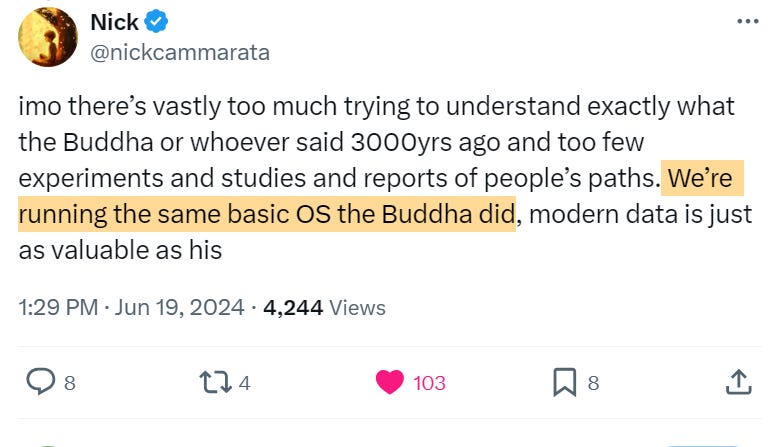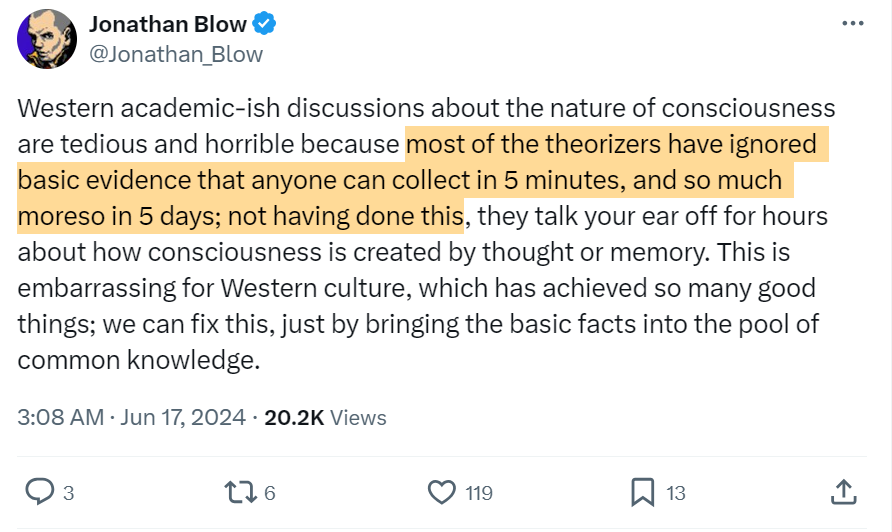"We've been wrong about math for 2300 years & I'm here to fix it"
David Bessis claims we can resolve a thousand year philosophical conundrum, and I think that's awesome! More of this please
I stumbled on this post yesterday:
I read it carefully because it was retweeted by Steve Strogatz, a famous math prof whose work passes feyman’s razor (he succeeds in explaining highly technical things to a layperson without dumbing it down).
There’s one thing in particular that David says in this thread that resonated deeply:
the philosophical problem feels “ancient & unfixable”
Like many mathematicians, I had this weird feeling that something was deeply broken in the traditional way of presenting math.
I thought there was nothing I could do about it, because the issue seemed ancient and unfixable, and it almost felt like a structural feature of math.
This is a familiar feeling.
You know when you have minor but omnipresent pain, like a toothache or canker sore, and you think “it’s gonna be SUCH a relief when this is gone and I’m back to normal”?
We don’t actually ever end up feeling that relief. Most of us just don’t think about it anymore once the problem is gone. You don’t find joy in the daily mundane thing you couldn’t do before, because you forget what it was like to NOT be able to do the thing.
I think we have the same bias towards problems in society. It feels like our problems are unfixable because we haven’t been able to fix them yet. We’ve solved a LOT of seemingly insurmountable problems, but we don’t think about them anymore.
(todo: does this bias/concept have a name?)
If you’re not paying attention, it feels like nothing ever changes. The problems we have are problems we’ve always had. You probably think they will all remain problems by the end of your lifetime. This is how *I* have always felt at least.
But this is not true. We solve insurmountable problems all the time and things DO really change.
(todo: this can be an offshoot essay, what are examples of things that DID change, that we DID fix, that we don’t think about anymore? below are vague ideas until we have better examples)
(is this what is trying to document?)
I wasn’t really politically literate 10 years ago, but I THINK the way the Israel/Palestine conflict is playing out today *is* different from what would have happened 10 years ago. If you look at it zoomed out, it’s not that different, but zoomed in, I think it is (like 10 years ago the majority/public/youth didn’t understand & didn’t care?)
Maybe the best example I have is what’s going on with buddhism. There’s a lot of talk about the “jhanas”, this altered state of mind that you can reach with no drugs, just meditation. They’ve always believed this took years of practice to achieve, but, apparently you can do it in like a few days/weeks. We figured this out, in my lifetime.
I like what Nick said about “we’re running the same OS that the buddha did”.
People are deeply skeptical of anything that smells like: “you know that ancient problem that is as old as humanity? guess what, I have a fix for it!” this skepticism is good! but I think we go overboard, believing it is absolutely impossible to solve things that haven’t been solved by now. And THAT is just not true. This isn’t an opinion, this keeps happening! We keep solving these things and forgetting that we ever thought it was impossible.
Here was Jonathan Blow’s take on this jhana stuff.
I think this is really important: the truth is always simpler than the search for it. If something hasn’t been done for thousands of years, you expect the solution must be deeply profound and complicated. But that’s not always true. I love how Jonathan Blow has the gall here to say, you can rule out a lot of theories with 5 minutes of looking at the evidence yourself. I do believe this. It’s not always the case, but sometimes it is.
So, this is why I felt so excited about David’s thread, about finding a definition for math & solving this thousand year old philosophical quandary. We’ve stopped trying to solve problems like this. I think we gotta start trying again.
Why now?
It’s good to be skeptical and ask, “people have tried and failed for thousands of years. what is different now?” If we *do* solve a thousand year old problem, it’s often because something changed, scientifically, or culturally, or politically.
So I was delighted that David has an answer to this!
Why am I saying it might be possible to fix it now?
Because we’re reaching a time where the legacy philosophical nonsense about thought, cognition and language is finally dissolving. In the age of ChatGPT and Zoloft, unexamined dualism can only remain fashionable for so long.
His claim is simple: working mathematicians already share a consensus on what math is. We should start there. Document it, chart it, consolidate it, understand it.
(I think this can be done with repeatable rigor. I feel inspired by Who Are We Now, a book that attempts to do this for cultural identities across society, with incredible epistemic rigor)
We’ve never been here before
“There are no adults in the room” ← I think about this a lot.
No one has ever been here before. No one knows what the right answer is. We are on our own. I think this is a very scary feeling, but it’s true.
The more I dwell in this feeling, the more emboldened I feel. My “possibility search space of solutions to humanity’s problems” expands greatly.
What if I had a solution to a great problem of our species, that would totally work, but requires us to go around the Earth and connect every single household with little wires to *every other house* on the planet.
That sounds insane, but we did it. We did for electricity, for telephones, then the internet.
I don’t think our world or our lives are going to fix themselves. I don’t think our culture is going to fix itself. I used to complain a lot about how hard it is to make friends as an adult, about the lack of third spaces in our society.
But, no one is going to give me third spaces. Our ancestors who had third spaces, they didn’t come from nowhere, they created them. If an aspect of our culture is bringing us all down, we fix it. No one will fix it for us.
I used to feel like a passive observer of culture, the same way I used to feel like an observer at parties. If the vibe is off, my options were either (1) power through or (2) leave.
But that’s dumb.
Everyone at the party may be annoyed that the music is too loud. No one says anything, and everyone just goes home? what the hell are we doing? Just turn the music off, or ask, “hey is it just me or is the music is too loud?” we gotta try *something*.
So, here we are. The party is the planet. The music is too loud, and no one is doing anything about it. But we totally can! How many people are even trying?
I’ll leave you with Andrés Gómez Emilsson’s words:
Don't make the mistake of thinking that "someone else will take care of it". If that was the case, the problems would be solved already. Like anesthesia in the 1800s, most people have no idea the world could be better - we now take surgery with anesthesia for granted. But not back then.
Thanks for reading.








> (todo: does this bias/concept have a name?)
certainly it is at least named "taking [a thing] for granted" but rn i can't think of any fancier names it has :)
- "unfixable because we haven’t been able to fix them yet"
That bias may be a subset of The Argument from Ignorance or Hoyle's Fallacy.
- "todo: this can be an offshoot essay, what are examples of things that DID change, that we DID fix, that we don’t think about anymore? below are vague ideas until we have better examples"
::thumbsup::
- "But, no one is going to give me third spaces. Our ancestors who had third spaces, they didn’t come from nowhere, they created them. If an aspect of our culture is bringing us all down, we fix it. No one will fix it for us."
And we can, if we want them enough.